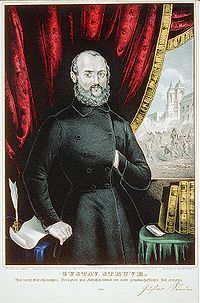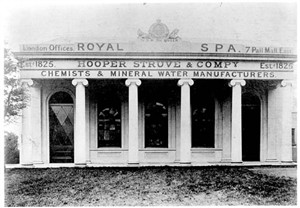Gustav von Struve 1805 – 1870
June 21, 2009
 Gustav von
Struve 1805 – 1870 was a
German politician, lawyer and publicist, and a revolutionary during the
German revolution of 1848 - 1849 in Baden.
Gustav von
Struve 1805 – 1870 was a
German politician, lawyer and publicist, and a revolutionary during the
German revolution of 1848 - 1849 in Baden.
Struve was a patron of Joseph Attomyr, and the German Central Association of Homeopathic Physicians.
Struve was a vegeterian.
Struve was born in Munich the son of a Russian diplomat Johann Christoph Gustav von Struve, whose family came from the lesser nobility. His father Gustav, after whom he was named, had served as Russian Staff Councilor at the Russian Embassy in Warsaw, Munich and The Hague, and later was the Royal Russian Ambassador at the Badonian court in Karlsruhe.
The younger Gustav Struve grew up and went to school in Munich, then studied law at university in Göttingen and Heidelberg. For a short time (from 1829 to 1831) he was employed in the civil service in Oldenburg, then moved to Baden in 1833 where in 1836 he settled down to work as a lawyer in Mannheim.
In Baden, Struve also entered politics by standing up for the liberal members of the Baden parliament in news articles. His point of view headed more and more in a radical democratic, early socialist direction.
In 1845, Struve married Amalie Düsar on November 16, 1845 and in 1847 he dropped the aristocratic “von” from his surname due to his democratic ideals. It was the time of the Vormärz, the years between the Congress of Vienna in 1815 and the revolutions of 1848-49.
Struve was strongly against the politics of Klemens Wenzel Prince von Metternich, a strict Conservative and reactionary against the democratic movement, who ruled Austria at the time and had a strong influence on restoration Germany with his Congress system.
Along with Friedrich Hecker, whom he had met in Mannheim, Struve took on a leading role in the revolutions in Baden from March 1848, also accompanied by his wife Amalie. Both Friedrich Hecker and Struve belonged to the radical democratic, anti monarchist wing of the revolutionaries. In Baden their group was particularly strong in number, with many political societies being founded in the area.
When the revolution broke out, Struve published a demand for a federal republic, to include all Germany, but this was rejected by “Pre Parliament” (Vorparlament), the meeting of politicians and other important German figures which later became the Frankfurt Parliament.
Struve wanted to spread his radical dreams for a federal Germany across the country, starting in southwest Germany, and accompanied by Friedrich Hecker and other revolutionary leaders. They organised the meeting of a revolutionary assembly in Konstanz on 14 April 1848. From there, the Heckerzug (Friedrich Hecker’s column) was to join up with another revolutionary group led by the poet Georg Herwegh and march to Karlsruhe. Few people joined in the march, however, and it was headed off in the Black Forest by troops from Frankfurt.
Friedrich Hecker and Struve fled to Switzerland, where Struve continued to plan the struggle. He published Die Grundrechte des deutschen Volkes (The Basic Rights of the German People) and made a “Plan for the Revolution and Republicanisation of Germany” along with the revolutionary playwriter and journalist Karl Heinzen.
On 21 September 1848 he made another attempt to start an uprising in Germany, in Lörrach. Once again it failed, and this time Struve was caught and imprisoned. Struve was freed during the May Uprising in Baden in 1849.
Grand Duke Leopold of Baden fled and on 1 June 1849 Struve helped set up a provisionary republican parliament under the liberal politician Lorenz Brentano. Prince Wilhelm of Prussia, later to become Wilhelm I of Germany, set out for Baden with troops. Afraid of a military escalation, Lorenz Brentano reacted hesitantly - too hesitantly for Struve and his followers, who overthrew him.
The revolutionaries took up arms and, led by Ludwik Mieroslawski, tried to hold off the Prussian troops, who far outnumbered them. On 23 July the revolutionaries were defeated after a fierce battle at Rastatt and the revolution came to an end.
Gustav Struve, along with other revolutionaries, managed to escape execution, fleeing to exile, first in Switzerland and then in 1851 to the USA.
In the USA, Struve lived for a time in Philadelphia. He tried to follow his radical democratic and socialist aims by publishing news articles, but did not gain a name for himself politically. In 1860, he published World History, the major literary product of his career and the result of 30 years of study.
At the start of the 1860s, Struve joined in the American Civil War in the Union Army, a captain under Blenker, and one of the many German emigrant soldiers known as the Forty Eighters. He was an abolitionist, and opposed plans to create a colony of freed slaves in Liberia because he thought it would hinder the abolition of slavery in the United States. Struve never became naturalized since he felt his primary objective was to battle the despots of Europe.
In 1863 a general amnesty was issued to all those who had been involved in the revolutions in Germany, and Struve returned to Germany. In the last years of his life, he became a leading figure in the initial stage of the German vegetarian movement. He had become a vegetarian as early as 1832 under the influence of Rousseau’s treatise Émile.
On 21 August 1870 he died in Vienna.
Of interest:
Samuel Hahnemann translated Demachy’s Art of manufacturing chemical products, with Struve’s additions in Leipsic in 1784, and Demachy’s Art of manufacturing vinegar, with Annotations by Struve in Leipsic in 1787. (These were works by the homeopathic chemist Struve in Bern) who conducted some early research on the use of belladonna in scarlet fever and scarlatina.
 Royal German Spa & Pump
Room
(Struve & Co,
Brighton)
in Essex in
1867.
Royal German Spa & Pump
Room
(Struve & Co,
Brighton)
in Essex in
1867.
Frederick Adolf Struve MD, proprietor of the “Salomoni’s Apotheke,” in the City of Dresden, Germany, opened a mineral spa in Brighton (he had opened similar spas at Berlin, Dresden and Leipzig), a research chemist from Saxony, had invented a machine that reproduced the characteristics of natural mineral water using chemicals.
In the first season there were 333 subscribers to the spa and in 1835, ten years after opening, Struve obtained the patronage of King William IV. Struve consequently renamed it the ‘Royal German Spa’…
By the 1850s the practice of taking waters fell out of fashion and the pump room closed. Struve was now producing bottled mineral water and fizzy drinks.
In 1891 another soft drinks firm merged with Struve and called themselves Hooper Struve Ltd. They very successfully continued to manufacture drinks still using the 150 foot well sunk by Struve.
Only in the Second World War did the spa stop production when it became a fire watching station and a gas mask issuing station.
Frederick Adolf Struve first commenced the manufacture (of artififical mineral waters made by impregnating water with gas) in 1815, in Dresden, and he introduced numerous improvements, and was the author of several important observations on the constitution of mineral waters; and to him belongs the credit of having produced the first artificial mineral water, exactly identical with the natural, and to him also we owe the introduction of artificial mineral waters into medical use. (Samuel Hahnemann did not approve of these ‘false’ mineral waters)
? Struve was a homeopath in Germany in 1832.
? Struve was a homeopathic apothecary in Dresden in 1852.
? Struve was a phrenologist in Germany in 1857.
? Struve was a homeopathic chemist in Bern in 1885.
Arztes Christian August **Struve** 1767 - 1807 was a patron of free innoculations for the poor in the 1790s.